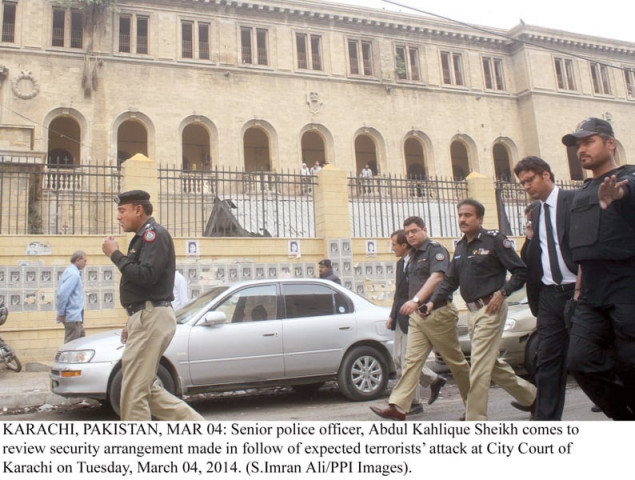No work to show: Thousands remain vulnerable as security remains lax at city courts
Plans to beef up security were devised in the wake of terror attacks on courts in Islamabad.

Police officials survey the City Court premises on March 4 to check the security arrangements in light of potential attacks. The security measures, decided by the stakeholders, are yet to be put in place. PHOTO: FILE
In consecutive meetings on March 3 and March 4, the chief justice of the Sindh High Court (SHC) and the home department’s additional chief secretary had mapped out an elaborate plan to step up security arrangements at the vulnerable site. The arrangements were to be put into effect within the next 20 days. Nothing seems to have materialised so far and the thousands of citizens, litigants and judges, who visit the city courts every day, are still vulnerable to potential attacks.
It had been decided to install five walkthrough gates and around 320 closed-circuit cameras in and around the courts. The number of police personnel deployed at the courts was also to be increased. Every person entering the court premises would be frisked and sliding gates were to be installed to restrict parking of vehicles within the premises. In addition to these measures, a command and control centre was to be established at the premises for digital surveillance while the parking lot, adjacent to the court premises, was to be placed under electronic vigilance.
Almost a month and a half later, the situation is almost the same, lamented Karachi Bar Association president Salahuddin Ahmed. The only positive outcome so far was the deployment of an additional 43 personnel. The total strength of personnel deployed at the premises is now 110, against the sanctioned strength of 151.
Ahmed revealed that no additional police mobile had been provided yet, while the only one available was frequently out of order. He had recently prepared a report on the lack of implementation on the security plan and sent it to the participants of the meeting.
The report found that there was ‘no progress’ in terms of installing the cameras and walkthrough gates and people were still parking their vehicles inside and around the court premises.
Ahmed’s report further revealed that there were no streetlights on the road behind the city court complex. District South deputy commissioner had been asked to arrange the street lights but it has not been done yet. “A number of violent crimes have occurred on that road, especially after dark,” Ahmed claimed. “The Judges Lodge is directly accessible from there.”
Commissioner Shoaib Ahmed Siddiqui, who attended one of the meetings, said that the home secretary was dealing with the matter and specific committees had been formed by the department in this regard. “I have very little role to play in this,” he said. When reminded that the DCs work under his command, the commissioner said that he would ask about the progress from the relevant officials. He was of the view, however, that ‘what was decided in the meetings should have been implemented on time.’
South zone DIG Abdul Khalique Shaikh said that the police had completed the assigned task of increasing the manpower. “Police is the only department doing the work. I can, at least, say that I have deployed the additional police force. What have the others done?”
Importing gadgets, including CCTV cameras and other equipment, was not the police’s responsibility, said DIG Shaikh. When asked why people were not properly frisked at check points, Shaikh’s response was an incredulous one. “It is easier to make people change their religion than to make lawyers follow procedure.”
The home department’s additional chief secretary, Niaz Ali Abbasi, dexterously avoided all attempts by The Express Tribune to question him about the lack of progress. His excuses ranged from, “I am currently away from the office and don’t have the file with me,” to “Please contact me later.”
Published in The Express Tribune, April 22nd, 2014.



















COMMENTS
Comments are moderated and generally will be posted if they are on-topic and not abusive.
For more information, please see our Comments FAQ